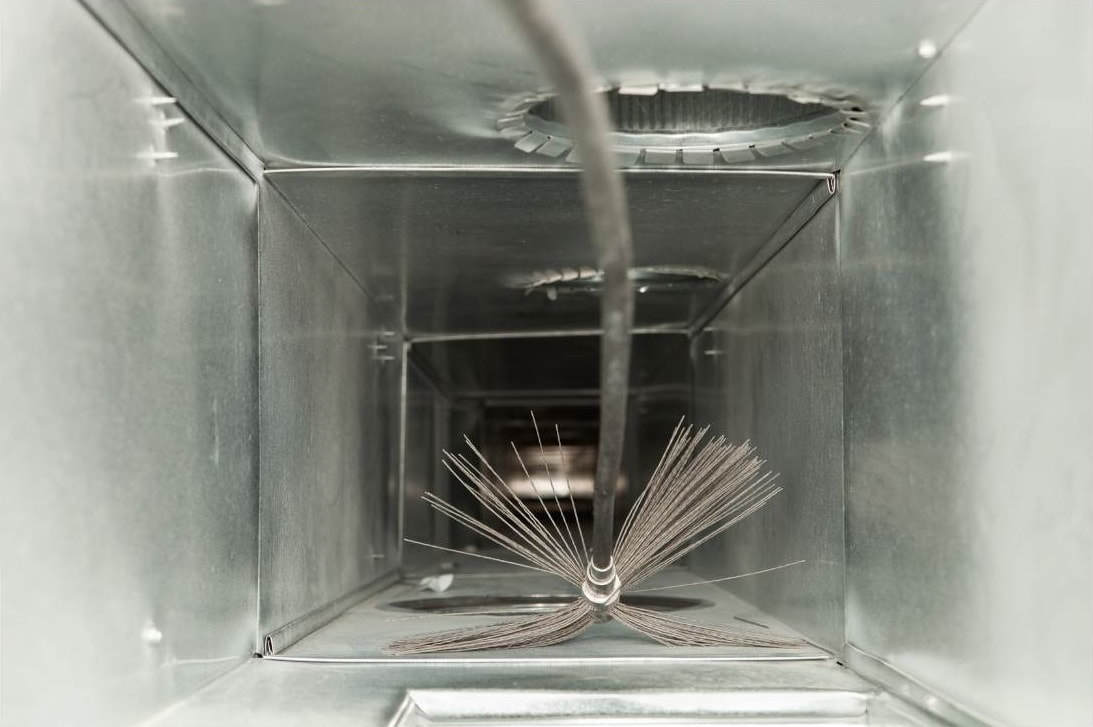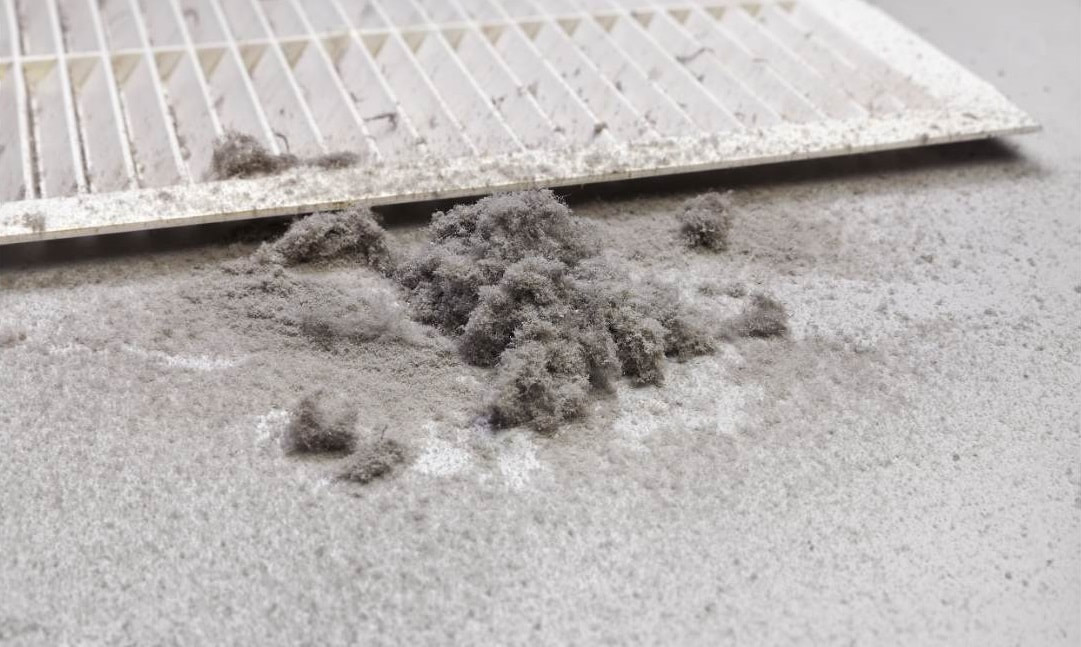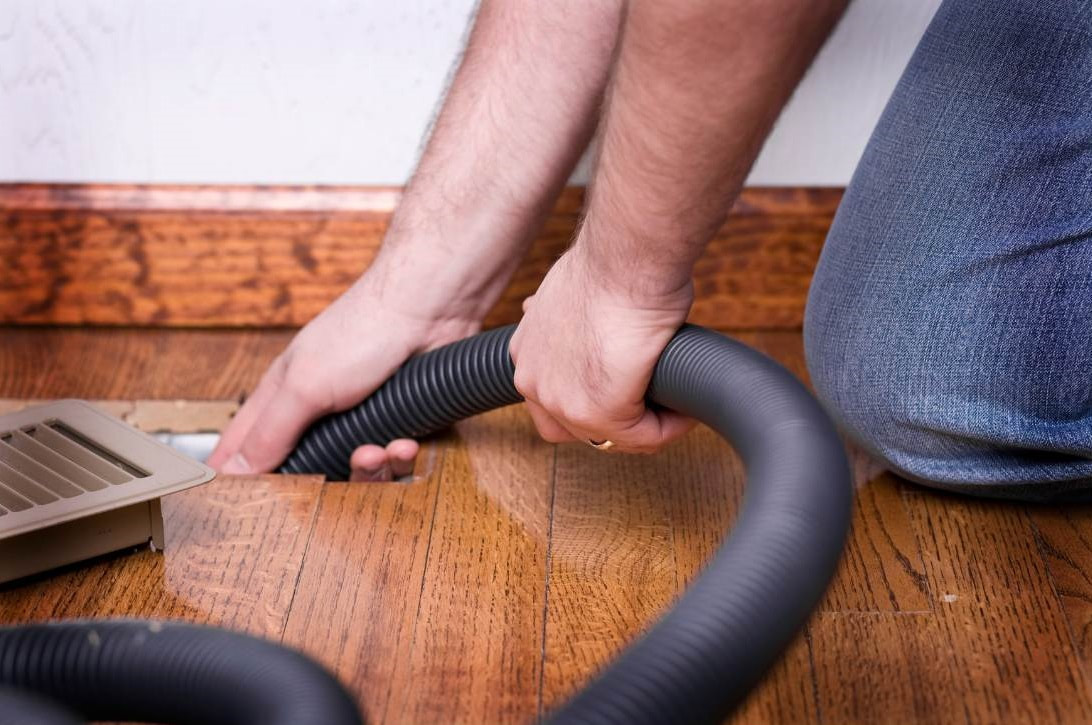ArchivesCategories |
Back to Blog
Keeping your home clean and comfortable is a top priority for most homeowners. Aside from regular vacuuming and dusting, there's one crucial space that often gets overlooked: the air ducts. These hidden pipes play a significant role in maintaining air quality in your home. Therefore duct cleaning is essential. So, how often should you clean your home's air ducts? The Basics Air ducts are a critical component of your home, circulating air from your heating, and air conditioning (HVAC) system into every room. While your HVAC system pulls in fresh air from the outside, it also recirculates the indoor air. Your furnace has a filter that needs regular changing to help minimize recirculating household dust. However, over time, dust, pollen, pet dander, and other contaminants can accumulate inside your ducts, impacting indoor air quality. The Ideal Cleaning Frequency While there's no right or wrong answer, experts generally recommend cleaning your air ducts every 2 to 3 years. This time-frame strikes a balance between maintaining clean ducts and avoiding unnecessary expenses under normal circumstances. With that said, many experts also agree that an annual cleaning can be valuable if you suffer from allergies or have pets. Signs It's Time to Clean Sometimes, your ducts will give you signs that they need a good cleaning. Here are a few things to watch out for:
Special Circumstances Certain situations may warrant more frequent duct cleaning:
Trust the Professionals While some homeowners may try DIY duct cleaning, it's more effective to hire professionals. Duct cleaning companies use specific equipment that does more than vacuum your ducts. Using a standard shop vacuum may only provide access to the first 2 or 3 feet of the ducts, while dust and debris can accumulate much deeper within the system, beyond the reach of a regular vacuum. Maintaining clean air ducts is required for a healthy home environment. By understanding how often to clean your air ducts and recognizing the signs that cleaning is needed, you can take proactive steps to safeguard indoor air quality and the well-being of your family. So, don't forget to add duct cleaning to your home maintenance checklist.
0 Comments
Read More
Back to Blog
When you think about keeping your home clean, you might not think about your air ducts. But they play a role in the health and comfort of your home! Let's review why cleaning your air ducts is so important.
Cleaner Air Means a Healthier Environment Air ducts are like the lungs of your home. They circulate air throughout every room. Over time, dust, pollen, pet hair, and dirt can build up in your vents. When you turn on your heating or cooling, that dirt gets blown into the air you breathe. Cleaning your air ducts every year removes the build-up. That means cleaner air for you and your family to breathe. It can help reduce allergies and keep everyone feeling better. Keeping Your Home Comfortable If it feels like your home doesn't warm up or cool down like it should? That could be because your air ducts are dirty. When they become clogged with dust and debris, you restrict airflow. That means your heating and cooling systems work harder to keep your home comfy. Cleaning your air ducts helps the air flow freely. It makes your heating and cooling systems work better, which keeps your home at the right temperature. Plus, it can save you money on heating and cooling bills! Stop Mold Before It Starts Mold loves to grow in dark, damp places. And guess what? Your air ducts can be the perfect hiding spot for mold and mildew! If there's moisture in your ducts, mold can start to grow. And when mold spores get blown into your home, they can cause health problems. By cleaning your air ducts regularly, you can prevent mold or mildew before it becomes a big problem. It helps keep your home safe and healthy for you and your family. Make Your HVAC System Last Longer Your heating, ventilation, and air conditioning (HVAC) system works hard to keep your home comfortable. But when your air ducts are dirty, it puts extra strain on your HVAC system. That increased strain costs more to operate as your HVAC system has to work harder. Reduced airflow can lead to premature breakdowns and expensive repairs. Cleaning your air ducts helps your HVAC system run smoothly. It reduces wear and tear on the motor, so they last longer. That means a happier wallet! Cleaning your air ducts might not be the most enjoyable expense, but it's important for your family's health. It helps keep the air you breathe clean, your home comfy, and your HVAC system happy. So next time you complete home maintenance projects, don't forget the air ducts—they're a big deal!
Back to Blog
In the quest for healthier indoor environments, homeowners often consider air duct cleaning as a solution to improve air quality and enhance HVAC system performance. However, amidst the myriad of claims and counterclaims, a pertinent question arises: Does duct cleaning work? Let's explore some facts and debunk the myths surrounding this topic.
Understanding Air Duct Cleaning Duct cleaning involves the removal of dust, debris, and contaminants from the HVAC system's ductwork. Professionals argue that it can mitigate indoor air pollutants, allergens, and mold growth while improving the efficiency of heating and cooling systems. However, the effectiveness of duct cleaning depends on various factors, including the age of the ductwork, duct condition, the extent of contamination, and the cleaning methods employed. In Victoria's moist climate, mold, and mildew growth can be concerning, necessitating regular maintenance and inspection of HVAC systems. Regulatory Standards and Guidelines In Canada, there are no specific regulations mandating air duct cleaning. However, organizations like the National Air Duct Cleaners Association (NADCA) provide guidelines and standards for the industry. It's wise to engage certified professionals who adhere to these standards to ensure thorough and effective cleaning. Debunking Myths Myth 1: Duct Cleaning is Unnecessary While some skeptics argue that duct cleaning offers minimal benefits, research suggests otherwise. Accumulated dust, pet dander, pollen, and mold spores within ductwork can compromise indoor air quality and worsen respiratory issues, especially for individuals with allergies or asthma. Regular cleaning can alleviate these concerns and promote a healthier living environment by minimizing airborne dust particles for those suffering from allergies. Myth 2: Duct Cleaning Solves All Indoor Air Quality Issues Duct cleaning is just one aspect of indoor air quality management. It complements other strategies such as proper ventilation, air filtration, and humidity control. Addressing underlying issues like moisture and insulation problems is crucial to preventing mold growth and maintaining optimal air quality. Myth 3: DIY Duct Cleaning is Effective While DIY enthusiasts may attempt to clean ducts using household tools and equipment, professional cleaning services offer superior results. Trained technicians employ specialized tools and techniques to access and clean hard-to-reach areas within the ductwork. DIY attempts may inadvertently damage ducts or fail to eliminate hidden contaminants effectively. Benefits of Duct Cleaning Improved Air Quality: Removing contaminants from ductwork reduces airborne particles, allergens, and odors, enhancing indoor air quality and comfort. Enhanced HVAC Efficiency: Clean ducts facilitate better airflow, allowing heating and cooling systems to operate more efficiently and reducing energy consumption. Extended Equipment Lifespan: Regular maintenance, including duct cleaning, prolongs the lifespan of HVAC equipment by preventing premature wear and tear caused by debris accumulation. Partnering with reputable duct cleaning professionals who adhere to industry standards is essential. Regular maintenance, including duct inspection and cleaning, should be integrated into comprehensive indoor air quality management strategies to ensure healthy and comfortable living environments. While duct cleaning may not be a cure-all solution, its role in promoting better indoor air quality and HVAC system efficiency should not be overlooked. With informed decision-making and proactive maintenance, homeowners can breathe easier knowing that their indoor environments are clean and |

 RSS Feed
RSS Feed


